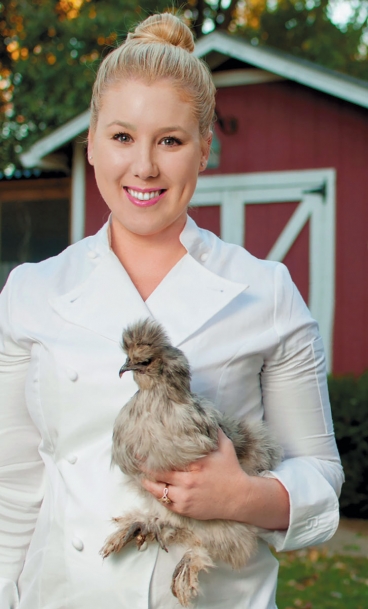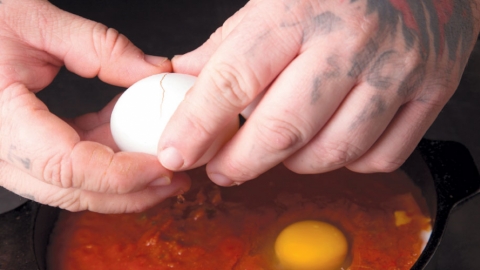Urban Homesteading
Harvesting the fruits of the farm in an urban setting
“We’re getting a chicken coop!” I exclaimed. My husband just shook his head, chuckled and resigned himself to the fact that we were about to be inundated with baby chicks. I had logged on to MyPetChicken.com, an online hatchery, and ordered six chicks of assorted breeds to make for a most colorful egg basket in the coming months. To have my own farm-fresh eggs right in my backyard was too tempting of a notion; I had to commit to becoming the caretaker to a full-on chicken coop.
After two straight years of enjoying my very own kitchen garden I was eager to expand. I didn’t just want to add more plants into my garden next spring—I wanted to step up my backyard farming game in a whole new way. Growing your own produce is so rewarding. When you add fresh eggs to that it makes you more invested in what your family is eating and your consumption in general. You realize what exactly goes into growing one red juicy delicious tomato or how amazing four freshly laid eggs are. Spoiler alert: The eggs are delicious!
Urban chickens have become popular in the last few years as people pay more attention to where their food comes from. There is something so satisfying about opening up the nesting box and seeing your very first chicken egg. I keep a ceramic egg dish in my refrigerator and I can look in at any time and name which chicken laid which egg based on the shell color.
To gather more information I consulted known chicken lady Linda Kupke, a friend of a friend. She told me about the fine points of coop design, chicken ownership and how it’s all worth doing for the delicious eggs every day. Animal husbandry is a commitment that deserves a lot of thought and consideration. There are not-so-fun parts of keeping chickens, but talk to any chicken keeper and they’ll tell you that the rewards far outweigh the hard work. Steps to deciding whether chicken ownership is right for you are:
1. Check local ordinances to make sure backyard chickens are legal in your area. Tulsa County allows six adult chickens; Broken Arrow and Owasso allow for unlimited hens but no roosters.
2. Educate yourself about the upkeep and responsibility. I suggest reading Raising Chickens for Dummies. Visit chicken-keeping blogs such as Fresh Eggs Daily and The Chicken Chick; both are great and have all the information you will need from coop construction to which breeds to look into.
3. Set up your coop and brooder before you get your chicks: bedding, light, feed, etc.
4. At 8 weeks the chickens will be old enough to live on their own in the coop outside. Make sure your coop is well ventilated and outfitted with the basics: roosting area with poop board underneath, nesting boxes, and an outdoor run. Make things easier for yourself by installing a fresh water system and automatic feeder.
5. Depending on breed your chickens will begin to lay at 6 months of age. Signs to look for are “the submissive squat” when your chicken will squat down when you approach them. Another telltale sign is that their combs and wattles will become dark red.
The best thing about chickens are the eggs but it’s also a joy to interact with these wonderful creatures, which have personality to boot. I have named all of my chickens and they each have their own way about them. I have Silkies named Peaches & Pretty, a Lavender Orpington named Princess, Black Copper Marans named Blackie and Copper and an Easter Egger named Skye. Each breed lays a different color egg, ranging from chocolate brown to robin’s egg blue—no Instagram filter needed.
So here I am, two years later. Our chickens are doing great and we’ve learned so much. We’ve worked out the kinks. I’ve started to get the itch again. This time, I’ve started researching backyard honeybees. After speaking with some seasoned beekeepers, scouring the internet and beekeeping books and taking a two-hour introduction to keeping honeybees class, I’ve decided to start my first hive this summer.
The most compelling reason goes beyond the delicious honey I will soon be able to enjoy. Supporting honeybees is critical to our food supply. The addition of honeybees to our backyard will bring our hobby farm full circle: The bees pollinate the garden, the chickens fertilize the garden, the discarded produce feeds the chickens. Finally, the chicken eggs, the produce from the garden and the delicious local honey feeds the home.







